|
|
|
Sort Order |
|
|
|
Items / Page
|
|
|
|
|
|
|
| Srl | Item |
| 1 |
ID:
142582
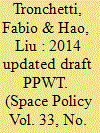

|
|
|
|
|
| Summary/Abstract |
On June 10, 2014, Russia and China presented the updated Draft Treaty on the Prevention of the Placement of Weapons in Space, the Threat or Use of Force Against Space Objects (PPWT) to the Conference on Disarmament. The original 2008 Draft PPWT had been poorly received and criticized, inter alia, for not addressing the most pressing threats to space objects, strategically favoring the interests of its co-sponsors and lacking reliable means of verification.
In presenting the 2014 update the Russian and Chinese representatives pointed out that it had been drafted by taking into account the criticism leveled to its 2008 version and that it should be now viewed as an international effort rather than as a mere Chinese and Russian initiative: they also added that for this reason the amended Draft PPWT constituted a solid instrument to enhance the security of space objects and stood a higher chance of success than its predecessor.
It is, thus worth wondering whether the positive attitude and high expectations of China and Russia towards the amended Draft should be shared or rejected (counteracted, opposed). The present paper gives a rather negative answer to this question. While proceeding to a substantial re-wording and re-organization of its text, the amended Draft maintains the most controversial and debatable aspects of its 2008 version. Therefore, it seems unlikely that delegations within the CD might support it.
Despite its overall negative assessment, the present paper argues that the submission of 2014 updated Draft PPWT may positively contribute, at least indirectly, to the security of space objects. The likely failure of the amended draft could be used by the CD members as an opportunity to focus their efforts in putting in place legal barriers to selected threats to space objects, such as the testing of destructive, debris-generating, ASAT devices. There are elements to believe that a ban on destructive ASAT tests could be achieved and acceptable by the majority of States.
|
|
|
|
|
|
|
|
|
|
|
|
|
|
|
|
| 2 |
ID:
142576
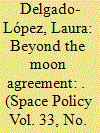

|
|
|
|
|
| Summary/Abstract |
The 1979 Moon Agreement was conceived as a way to help manage one of the expected outcomes of expanded activities on the Moon: exploitation of its natural resources. However, the fifth of the international space treaties elaborated in the early stages of the Space Age failed to receive widespread acceptance. Persisting polarization about key provisions in the Agreement hampers its success in the near future. This article examines the legacy of the Moon Agreement from a policy perspective by identifying key principles that are poised to resurface in the near future with the advent of new actors in space, especially the private sector. It argues that the development of norms of behavior together with national regulation and legislation represent the most promising way to engage established and emerging space actors in ensuring responsible behavior beyond Earth orbit.
|
|
|
|
|
|
|
|
|
|
|
|
|
|
|
|
| 3 |
ID:
142579
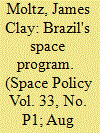

|
|
|
|
|
| Summary/Abstract |
Brazil's space program represents an anomaly among those of the world's 10 largest economic powers. During a time that has witnessed the rapid emergence of a variety of national space programs—even among lesser powers like Iran and South Korea–Brazil's failure to emerge as a significant space actor requires further analysis. This article traces the history of Brazil's space efforts and examines the factors that have held it back, some of which continue to influence its policies today: inadequate funding, conflicting organizations, poorly handled foreign relations, and an unclear national vision for Brazil's “place” in space. Recent efforts to overcome these hurdles through an improved domestic strategy and smarter international relations show promise. But a more sustained political commitment to space development will be needed if they are to succeed.
|
|
|
|
|
|
|
|
|
|
|
|
|
|
|
|
| 4 |
ID:
142580
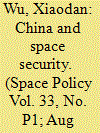

|
|
|
|
|
| Summary/Abstract |
There is an obvious gap between China's express intention to be a responsible space actor and the perception of its being a possible or imminent threat to space security. This article identifies the elements leading to the false perception held by some States based on an evaluation of China's space-related controversial events: the ideological and military considerations; the misunderstanding and obscurity surrounding China's space policies and activities; the inaccurate contention of China's non-compliance with its international legal obligations and its lack of expertise and experience in international negotiations. Based on the historical opportunities that the China's current government is facing, the conclusion will be reached at how to bridge this gap through transparency improvement and the establishment of confidence-building measures, including the elimination of military involvement and encouraging commercial exploration and utilization of outer space through national legislation; the improvement of the space governance mechanisms; more effective, targeted and meaningful information exchange and policy dialogue to enlarge cooperation and forge strategic military trust.
|
|
|
|
|
|
|
|
|
|
|
|
|
|
|
|
| 5 |
ID:
142577
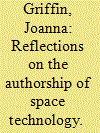

|
|
|
|
|
| Summary/Abstract |
The paper offers a proposition in which the notion of the 'ownership' of outer space is substituted for that of 'authorship'. The notion of authorship draws attention to the processes of critical thinking, re-contextualization and resistances to space technology that take place in social domains where no clear role exists either as audience or user of space technology. The proposition responds in part to interventions made by artists in recent years into the workplaces of space technologists and, incrementally, into the imaginaries that inform the kinds of activities that happen in space. Artistic processes expose the reception of space technology at an intimate scale where the agencies of the viewer to observe, absorb and rethink converge with the shaping of space technology via state mediation and space agency imperatives. The constituency of collective authorship to which space technologies are subject is revealed in unexpected ways through artistic intervention that suggests a reappraisal of some of the terms of reference guiding space policy.
|
|
|
|
|
|
|
|
|
|
|
|
|
|
|
|
| 6 |
ID:
142581


|
|
|
|
|
| Summary/Abstract |
Given the renewed interest in exploring and exploiting the resources of the Moon, this paper will explore the proposition that sustainability should be a fundamental consideration when formulating policy in respect of regulating lunar activities. The current lunar regulatory framework, however, is a product of the Cold War and conceived at a time when sustainability and space environmental issues were not within the contemplation of policy makers. Yet there is an increasing awareness of the need for space sustainability within the space community and this should be focused towards shaping policy in respect of lunar exploration. Inherently linked to this is a new multi-sectored era of space activity with emerging space nations and private companies competing alongside established space actors to exploit the natural resources of the Moon. Disputes over legally binding methods of lunar resource allocation are harming the chances of obtaining any consensus regarding sustainable development. This discussion will show that there is no compelling evidence that commercial mining of the Moon will yield the vast natural resources that would make such a venture economically viable. It will be advocated that a policy of promoting the use of the moon for scientific and exploratory purposes by means of existing fora such as IDAC and using non-binding codes to create normative values of sustainability should be placed at the heart of lunar exploration policy.
|
|
|
|
|
|
|
|
|
|
|
|
|
|
|
|
| 7 |
ID:
142578
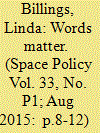

|
|
|
|
|
| Summary/Abstract |
The global community of scientists involved in finding and tracking near-Earth asteroids (NEOs), identifying potentially hazardous NEOs, and characterizing the possible effects of asteroid impacts with Earth is developing an awareness of the need to improve and expand efforts to communicate with policy and decision makers about the work they do.
This paper addresses the criticality of clear, concise, correct communications about asteroid impact risks and hazards, as well as proper distinctions among risks, hazards, and actual threats. It reviews recent progress in communication about NEO hazards and impact risks, including new recommendations from expert groups, guidelines for responsible communication about hazards and risks, communication issues raised in collaborations with disaster planners, and other relevant developments.
The next significant asteroid impact with Earth could be 500 years from now, or next week. The need to be prepared for such an event is clear. Policy and decision makers will depend on the community of experts involved in NEO observations and planning for planetary defense for information on the risks and hazards of asteroid impacts with Earth.
|
|
|
|
|
|
|
|
|
|
|
|
|
|
|
|
|
|
|
|
|